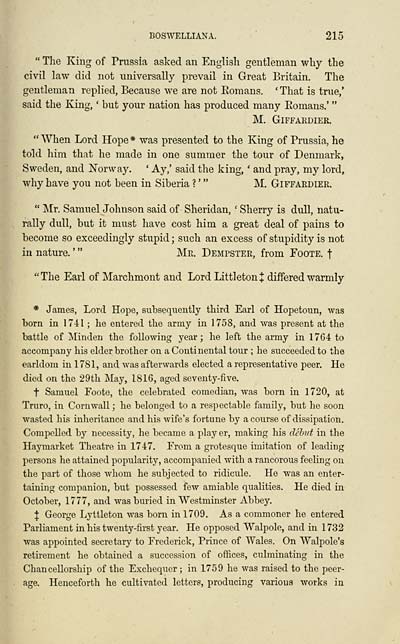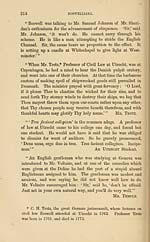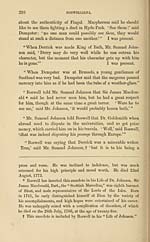Grampian Club > Boswelliana
(249) Page 215
Download files
Complete book:
Individual page:
Thumbnail gallery: Grid view | List view

BOSWELLIANA. ' 215
" The King of Prussia asked an English gentleman why the
civil law did not universally prevail in Great Britain. The
gentleman replied, Because we are not Eomans. ' That is true,'
said the King, ' but your nation has produced many Eomans.* "
M. GiFFARDIER.
" When Lord Hope * was presented to the King of Prussia, he
told him that he made in one summer the tour of Denmark,
Sweden, and Norway. * Ay,' said the king, ' and pray, my lord,
why have you not been in Siberia ? ' " M. Giffardier.
" Mr. Samuel Johnson said of Sheridan, ' Sherry is dull, natu-
rally dull, but it must have cost him a great deal of pains to
become so exceedingly stupid ; such an excess of stupidity is not
in nature. ' " Mr. Dempster, from Poote. f
"The Earl of Marchmont and Lord Littleton + differed warmly
* James, Lord Hope, subsequently third Earl of Hopetoun, was
born in 1741 ; he entered the army in 1758, and was present at the
battle of Minden the following year; he left the army in 1764 to
accompany his elder brother on a Continental tour ; he succeeded to the
earldom in 1781, and was afterwards elected a representative peer. He
died on the 29th May, 1816, aged seventy-five.
t Samuel Foote, the celebrated comedian, was born in 1720, at
Truro, in Cornwall ; he belonged to a respectable family, but he soon
wasted his inheritance and his wife's fortune by a course of dissipation.
Compelled by necessity, he became a player, making his dehvt in the
Haymarket Theatre in 1747. From a grotesque imitation of leading
persons he attained popularity, accompanied with a rancorous feeling on
the part of those whom he subjected to ridicule. He was an enter-
taining companion, but possessed few amiable qualities. He died in
October, 1777, and was buried in Westminster Abbey.
% George Lyttleton was born in 1709. As a commoner he entered
Parliament in his twenty-first year. He opposed Walpole, and in 1 732
was appointed secretary to Frederick, Prince of Wales. On Walpole's
retirement he obtained a succession of offices, culminating in the
Chancellorship of the Exchequer ; in 1759 he was raised to the peer-
age. Henceforth he cultivated letters, producing various works in
" The King of Prussia asked an English gentleman why the
civil law did not universally prevail in Great Britain. The
gentleman replied, Because we are not Eomans. ' That is true,'
said the King, ' but your nation has produced many Eomans.* "
M. GiFFARDIER.
" When Lord Hope * was presented to the King of Prussia, he
told him that he made in one summer the tour of Denmark,
Sweden, and Norway. * Ay,' said the king, ' and pray, my lord,
why have you not been in Siberia ? ' " M. Giffardier.
" Mr. Samuel Johnson said of Sheridan, ' Sherry is dull, natu-
rally dull, but it must have cost him a great deal of pains to
become so exceedingly stupid ; such an excess of stupidity is not
in nature. ' " Mr. Dempster, from Poote. f
"The Earl of Marchmont and Lord Littleton + differed warmly
* James, Lord Hope, subsequently third Earl of Hopetoun, was
born in 1741 ; he entered the army in 1758, and was present at the
battle of Minden the following year; he left the army in 1764 to
accompany his elder brother on a Continental tour ; he succeeded to the
earldom in 1781, and was afterwards elected a representative peer. He
died on the 29th May, 1816, aged seventy-five.
t Samuel Foote, the celebrated comedian, was born in 1720, at
Truro, in Cornwall ; he belonged to a respectable family, but he soon
wasted his inheritance and his wife's fortune by a course of dissipation.
Compelled by necessity, he became a player, making his dehvt in the
Haymarket Theatre in 1747. From a grotesque imitation of leading
persons he attained popularity, accompanied with a rancorous feeling on
the part of those whom he subjected to ridicule. He was an enter-
taining companion, but possessed few amiable qualities. He died in
October, 1777, and was buried in Westminster Abbey.
% George Lyttleton was born in 1709. As a commoner he entered
Parliament in his twenty-first year. He opposed Walpole, and in 1 732
was appointed secretary to Frederick, Prince of Wales. On Walpole's
retirement he obtained a succession of offices, culminating in the
Chancellorship of the Exchequer ; in 1759 he was raised to the peer-
age. Henceforth he cultivated letters, producing various works in
Set display mode to: Large image | Transcription
Images and transcriptions on this page, including medium image downloads, may be used under the Creative Commons Attribution 4.0 International Licence unless otherwise stated. ![]()
| Publications by Scottish clubs > Grampian Club > Boswelliana > (249) Page 215 |
|---|
| Permanent URL | https://digital.nls.uk/82554392 |
|---|
| Description | Note: Numbers 24-41 are relative to but not part of the Club's series. |
|---|---|

